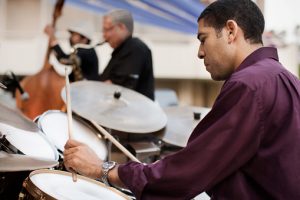By Nick Kiekenapp
Whether you are studying music in an academic setting, pursuing a career in the music industry, or educating the next Mozart, you have likely been asked questions like:
I didn’t know you could study music in college. What are you going to do with your degree in music?
Or, if you have already graduated with a music degree, you often hear:
So what’s you real job?
These questions often do not have simple answers, as many professional musicians earn their income via several  sources. Post-secondary degrees in Music Performance, Music Education, Music Theory, Music Business, Liturgical Music and Recording Technology are some popular pathways to prepare for a career in music. The technical abilities musicians develop through these different areas of study can lead down a variety of career paths.
sources. Post-secondary degrees in Music Performance, Music Education, Music Theory, Music Business, Liturgical Music and Recording Technology are some popular pathways to prepare for a career in music. The technical abilities musicians develop through these different areas of study can lead down a variety of career paths.
What careers do music degrees lead to?
Graduates with music degrees often apply their musical abilities and creative skills in fields such as:
- Touring Musician
- Freelance Musician
- Composer
- Arranger
- Music Director
- Music Teacher (private lessons)
- Music Teacher (K-12)
- Church Musician
- Recording Technician
- Recording Artist
- Booking Agent
- Live Sound Engineer
- Sound and Video Editor
- Producer
- Cruise Ship Entertainer
- Military Musician
- Instrument Repairer
- Music Therapist
What transferable skills do music graduates have?
Many music graduates pursue careers outside of the music—either as a “day job” in tandem with a music career, or as a different pathway altogether. And while those careers may seem to have nothing to do with music, the fact is that musicians develop a range of transferable skills throughout their intense study of music.
With regard to employability outside of music careers (i.e. a “real job” or “day job”), music graduates have developed soft skills which are valuable in any workplace. Here are some of the soft skills developed through studying music:
- Participate as a team member
- Active listening
- Determined and Persistent
- Quick Learner
- Think Critically
- Meet Goals
- Follow Directions
- Attention to Detail
- On Time
- Improvise
- Synthesize Vast Amounts of Complex Information
- Communicate Well
- Self-Motivated
- Flexible
- Creative Problem Solving
What other skills should I develop for a successful career in music?
Professional musicians often develop strong entrepreneurial skills to maintain a successful career. Whether choosing a full-time music career or keeping a day job for more stability, there are many essential skills required for a successful music career. These skills include:
- Networking
- Social Media Presence
- Self-Promotion
- Grant Writing
Want to learn more? Explore other careers with CareerOneStop’s Occupation Profile.
